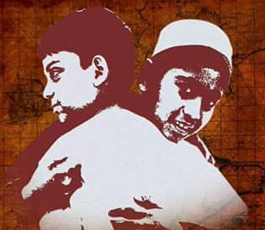
Hindus of village Varsola, Memdavad, Kheda
Versola village in Memdavad taluka, Kheda district man aged to escape the communal bloodletting that rocked Gujarat in 2002, due mainly to the pro-active efforts of its leaders. This village has a considerable Muslim population and is surrounded by Hindu villages on all sides.
After the incident at Godhra, rumours flew thick and fast in both the Hindu and the Muslim localities about impending attacks by the other community. The neighbouring villages drew up plans to target the only Muslim population in their midst, in Versola. Bipinbhai Bhoi, sarpanch of Versola, recalls the anonymous calls he received informing him about plans to attack the Muslims of his village and asking for his co-operation. However, the Hindu leaders of Versola decided that they did not want to be party to any such attacks. They held a meeting with Muslim leaders of the village to chalk out a plan for the safety and well being of all villagers.
Gautambhai Chauhan, district president of the Congress party and professor at the local Commerce College, recalls that at this meeting the Muslim leaders suggested that the Hindus of the village should themselves demolish the two village mosques so that outsiders would not be tempted to attack Versola. However, the Hindu leaders assured them that they would protect the Muslims and their properties, including the mosques and the dargah, with their lives if need be. Accordingly, outsiders who were keen to attack the Muslim villagers were informed that the Hindus of Versola would oppose any such move. Hindu and Muslim leaders stayed together throughout this period to reassure the villagers and scotch any misunderstanding or rumour at the source itself.
Gautambhai concedes that there was tremendous pressure from ‘outsiders’ but the Hindus of the village did not cave in. They received numerous phone calls and, as was the pattern, even bangles were sent to Versola. But the villagers stood firm in their commitment to their Muslim neighbours. They told the callers that this was an internal village matter and their interference was not welcome.
The police was also informed about the threats to the village and patrolling was initiated but the villagers did not rely on the police for their protection. They were prepared to defend the village themselves. Once, a mob even approached Versola. The Hindu villagers took up positions outside the mosques and the dargah and stopped the outsiders from entering the village. The Hindu village leaders went out, met the mob and convinced its leaders to spare Versola. As a result, the village remained peaceful throughout.
No Muslim family fled the village. In fact, Muslims who faced communal tensions in their own villages moved in with their relatives in Versola. After the tensions subsided, some of these Muslim families decided to stay in Versola permanently.
Gautambhai believes that they were able to avoid conflict because of the trust and good relations between the two communities, which have been built over decades. They participate in each other’s festivals and major occasions like births and marriages are celebrated together even today.
Gautambhai names many other villages in the district where Hindus and Muslims lived peacefully, side by side, throughout the period of communal disturbances. He firmly believes that wherever there were strong and able leaders who believed in communal harmony and were concerned about the well being of their villages, they managed to preserve peace and communal amity even in the midst of communal conflagration all around them.
Archived from Communalism Combat, June 2004 Year 10 No. 98, Cover Story 8
